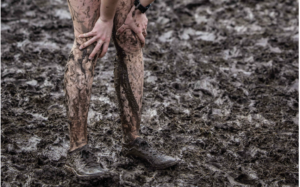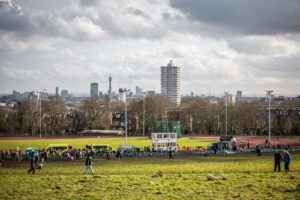Basil Heatley, A Tribute
7 min readBasil Heatley, a young 17 year old worker from a farm just outside Coventry saw an advert by Godiva Harriers asking for would be athletes to take part in a recruitment ‘Novice Race’. Basil, having been very interested in athletics since seeing the great Czech runner Emile Zatopek’s medal achievements in the 1948 London Olympics at 5,000m (silver) and 10,000m (gold), decided to try his luck. And yes, he won that race.
He soon became a member of the famous Coventry Godiva Harriers and immediately showed what a very promising young runner he was to become. After only four months, he competed in the ECCU 1951 National Youths Cross Country Championships at Richmond, Yorkshire, and finished third. What a great talent the officials of Coventry Godiva had found.
The following year, Basil now a Junior athlete, went on to finish third in the ECCU National held at Great Barr, Birmingham leading Coventry to win the Junior title.
Moving on a few years to 1957 Basil, now a senior athlete, finished fifth at the home of Cross Country, Parliament Hill Fields. The race was won by Frank Sando but Basil’s fifth position gained him selection for England to run in the International Cross Country Championships (Now the IAAF World Championships), In Belgium. Here he had an excellent run and by finishing second was instrumental in helping England secure the team award. What an achievement!
Between 1957 and 1964 Basil was only once outside the top ten finishers in the ECCU National Championships. These included three national Cross Country titles in 1960, 1961 and 1963. His win in 1963 at Cambridge also helped Coventry Godiva Harriers win the overall team award.
1959 saw Basil win the Inter Counties Cross Country Championships by a huge margin. During this period, he was a regular member of the English team at the International Cross Country championships where in 1961 he completely ‘thrashed’ the field by winning the title by a margin of 23 seconds.
1961 was also a very successful year for Basil on the track. He took part in the AAA 10 mile track championships at Hurlingham where he set a new World record for the distance of 47 minutes 47 seconds. This took 25 seconds off Zatopek’s previous record. Little did Basil think way back in 1948, when reading about Zatopek’s achievements, that he would one day be beating his hero’s world marks?
During all this time of course, as well as his achievements Nationally and Internationally, Basil ran for his club as often as National and International commitments permitted. He seldom missed a Birmingham Cross Country League race where he consistently set records that will probably never be matched. Unfortunately for us, records do not go that far back, but an estimate in excess of 20 wins over the years would not be far short of the mark!
Added to all this let us not forget that his tally of Midland Cross Country titles is more than impressive. He won no less than eight Midland titles. Youths 1951, Junior Champion 1954 and 1955 and five senior titles 1957, 58, 59, 60 and 1964. He also has very impressive results from Warwickshire County Championships both on the track, on the road and over the country. In Basil’s day, Road relay events in Warwickshire were plentiful as were two mile team races on the track.
After narrowly missing out on selection for the ‘big’ games on the track, Basil decided to have just one more crack at selection for the Olympics in Tokyo in 1964 before his retirement. He realised that although his favourite discipline of Cross Country, was not an Olympic sport, and not one of the speed athletes he was however one of the strongest athletes so he decided to give the Marathon one more try.
Basil had run the distance in 1956 when he won the Midland Marathon title in 2hrs 23 minutes. Following this success he decided to concentrate on shorter distances and cross country in particular. Club mate Brian Kilby had shown just what could be achieved over the marathon distance by winning the AAA title in 1960 and selection for the team for the Rome Olympics. He had won the AAA title every year since. Yet another teammate Juan Taylor, also took on the Marathon challenge with great results.
Basil realised that here was a last chance to finish his career on a high with the Tokyo Olympics his goal. After rigorous training and commitment in 1963 he entered the Polytechnic marathon, which was a linear route from Windsor Castle to the track at Chiswick. Competition between Basil and Ron Hill was fierce and eventually, over the last six miles, Basil managed to pull away from Ron to set a new World Best for the distance of 2hrs 13 min 55sec. (We might ask ourselves how many athletes in the UK today have achieved this time with all the advantages of modern training facilities and equipment). This performance earned Basil, and indeed Ron Hill who finished only about 100 yards behind him, selection for the Tokyo Olympics only four months away. Unfortunately this became a problem for Coventry Godiva athletes Brian Kilby and Juan Taylor. These two highly regarded Godiva runners with established reputations as high class marathon men, were left to fight it out in the AAA marathon later in the year for the third place in the British team. In a hard fought battle in very warm conditions Brian won the day with Juan having to drop out through the hot conditions
The race itself in Tokyo is the race that most people will remember Basil for, despite all his other achievements throughout the country. His last 200 meters in 32.2 sec to pass the Japanese runner and claim the silver medal behind Abebe Bikila is now legend. What has been forgotten is that his club mate Brian Kilby, who I feel was Basil’s inspiration to try the marathon distance, finished in fourth place. The worst position of all. No UK athlete has ever bettered Basil’s performance since that 1964 Olympics achievement.
I understand that in Tokyo Basil shared a room with Brian Kilby, Maurice Herriott and Ernie Pomfret. Three Midland athletes, two of whom were steeplechasers. Whenever Basil suggested that the four of them should go for a steady jog they knew that once leaving the hotel it would be eyes down and full throttle until they arrived back at the hotel. No wonder Basil had few takers!
After their arrival in Tokyo and some two days later, the quartet decided it was time they got the bus down to the stadium. Basil suggested that they get the 9-00am bus. The four slowly strolled down to the bus stop but after about half an hour were still waiting. On making enquiries, they were informed that there was indeed a bus at 9-00am and it left at 9 precisely, not one minute later. First lesson learnt. Japanese transport leaves on time. Some days later Ernie became restless and acquired a guitar, much to the displeasure of Basil, and low and behold the guitar mysteriously disappeared. Was it the skill or choice of music that failed to please, we will never know!
Keeping in touch in Tokyo in those days was difficult, hard to imagine in this day of mobile phones and email. However on one occasion correspondence arrived for some of the quartet, sadly none for Basil. Basil was a bit miffed especially as one letter was for Maurice, written by
Jill congratulating him on his silver medal achievement. She requested he take care of Basil and pass on the message that she and the girls were wishing him well and missing him at home. We move on.
I understand that Basil, who lived just outside Coventry, was not always able to attend training at the club during in the week. However when he turned up for the Sunday morning run one could expect no mercy! It would be flat out from the start to the finish!
After Tokyo, Basil retired from International athletics but continued to run for his club, Godiva Harriers, for a few years afterwards. He showed the same level of commitment and support for the club as he had during his years at the very top. He continued to an inspiration and positive role model to many aspiring athletes.
Basil continued his support for athletics taking on many administrative rolls within the Midland Counties Cross Country Association. He became the MCCCA team manager from 1977 to 1982. Also in that year, he took over the English team manager’s position. He was the MCCCA secretary from 1982 until 1991 becoming it President in 1990.
Eventually Basil moved away from Coventry to take up a post with Dudley Council. During that period, he organised many events including an annual 25km road race from Brierley Hill baths. The route trailed through many of the small towns that make up the Black Country before finally returning to Brierley Hill.
In 2015 Basil was inducted into the England Athletics ‘Hall of Fame’ and was presented with his trophy by fellow clubmate and previous 5000 mts World record holder Dave Moorcroft. Two years later, he returned to present the Tokyo Steeplechase Silver Medallist, Maurice Herriott, with his ‘Hall of Fame’ induction award. This was a particular highlight for Basil who was most honoured to be able to perform that duty.
In 2017 Basil became the English Cross Country Association’s President and in his foreword to the ECCA Annual Handbook he commented on his first venture into ECCU, now ECCA, Championships in 1951. He was an active President and thoroughly enjoyed his year.
Basil we salute you.
Graham Heeley
19th August 2019.



